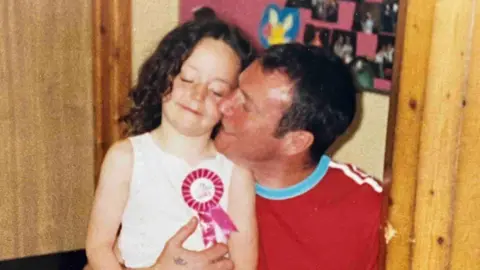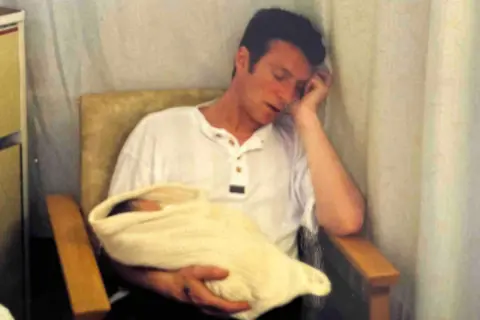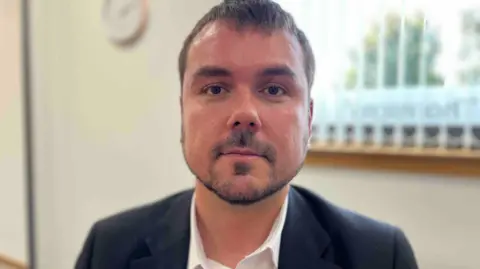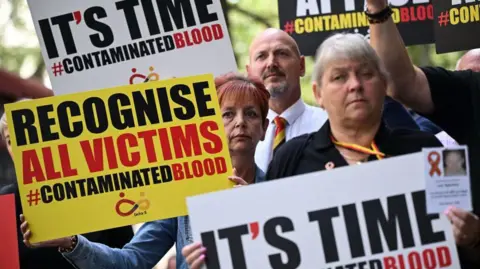Suzanne AllanBBC Scotland
 BBC
BBCMaegan Clay’s relationship with her father broke down during her childhood and she thought he was faking illness to excuse his behaviour.
It was only in 2019, when Maegan was in her 20s, they discovered he was one of thousands of people given contaminated blood products during the worst treatment scandal in NHS history.
Her dad, Campbell McPhee, went undiagnosed for 30 years after being infected by a blood transfusion in Inverness in the 80s.
Maegan feels they could have had a better relationship if the truth had been known.
Her parents split up when Maegan was small but she says she still saw her dad every week.
She says she was a daddy’s girl and he taught her how to swim and ride a bike.
She describes him as a “fun dad” but, over the years, that changed.
Maegan says he wasn’t showing up for her anymore and always seemed to be ill, leading her to feel she wasn’t important.
“As I got older my dad was sick a lot and I felt like he was bailing on me, and for other reasons at the time I felt that he was lying about being ill,” she says.
“I didn’t quite realise then what I know now and the relationship deteriorated.
“I just thought I was better off not being upset all the time that my dad wasn’t there.”

Campbell had been back and forth to the doctor for years, feeling constantly ill, with no answers despite numerous blood tests.
Doctors said they thought his problems could be related to drinking but they also tested for viral illnesses and cancer.
One day in 2019, while listening to the radio, he heard someone who had hepatitis C, detailing their symptoms and talking about being a victim of the Infected Blood Scandal.
Between 1970 and the early 1990s, more than 30,000 NHS patients were given blood transfusions, or treatments made using blood products, which were contaminated with hep C or HIV.
Some of the blood was from abroad, but in Scotland, the majority came from Scottish donors which included prisoners and drug users.
Listening to this was a lightbulb moment for Campbell.
He remembered that on Christmas Day 1988 – after an accident – he had been given a blood transfusion at Raigmore Hospital in Inverness.
Campbell went back to the doctors for a test and they confirmed hepatitis C

The virus had been undiagnosed for 30 years.
Known as the “silent killer”, hep C may cause few symptoms initially, with early signs including night sweats, brain fog, itchy skin and fatigue.
But for every year a person carries the virus, their chance of dying from liver cirrhosis and related cancers increases.
Meagan, who is now 28, says her father was angry that it had taken so long to get a diagnosis.
“I also felt at the time he felt a little bit of shame too, he didn’t want anyone to know, just wanted to keep it to himself, but mostly angry, we all were,” she says.
Campbell died in 2024, at the age of 61, just five years after finding out he had the disease.
“Over those last few years he wasn’t himself,” Maegan says.
“He wasn’t the dad that I knew. He had a lot of brain fog, it affected him, it affected his personality.”
Maegan wonders what their relationship might have been, had they known Campbell was genuinely very ill.
“I feel a lot of guilt a lot,” she says.
“If I’d known then, what I know now, I think our relationship would have been a lot different.
“I myself have suffered a lot of mental health problems because of the breakdown of my relationship with my dad. I wish I’d been there for him now.”
After years of campaigning by those affected, the UK government ordered an inquiry, conducted by Sir Brian Langstaff.
Last year, his main report found that along with donations being sought from high-risk groups, donors were not routinely screened before September 1991, despite the risk of bloodborne viruses being known about since the 1940s.
Shockingly, it also found that the government, civil service and NHS, over decades tried to cover up and deny this.
In October 2024, Chancellor Rachel Reeves said that the government had set aside £11.8bn to pay compensation to victims via the Infected Blood Compensation Authority.
Before he died Campbell McPhee got an interim payment of £100,000 from the Scottish Infected Blood Support Scheme.
However, there’s been criticism that full compensation is glacially slow in being paid out.
Earlier this year Sir Brian called the delay in providing it to victims as creating “an injustice all of its own”.

Jamie Lyons, of the legal firm Thorntons, who represents Maegan, has dozens of clients angry about the length of time it’s taking.
He says: “The scheme has just ground to a halt as far as we are concerned.
“The vast majority of cases that we have are all just sitting there.
“We can’t really do much until the full scheme opens up and the date for that is repeatedly being pushed back.”
He added: “There’s a risk people are dying, whilst they wait for these schemes to open up for payments to be made.”
Mr Lyons says there could be people affected that don’t know it yet.
“I think there’s people going around that don’t have the slightest idea that they may have been infected due to this,” he says.
“They could be getting treated for other illnesses that they’ve been told they have.
“I’ve certainly seen that, people being given the wrong diagnosis, people being told it could have been something else that’s contributed to the infection.”
 Getty Images
Getty ImagesThere isn’t a figure for the number of people who could be undiagnosed, but the Hepatitis C Trust says it gets two or three calls a month to their helpline for new cases.
We asked the Infected Blood Compensation Authority why it was taking so long.
A spokesperson said people have waited decades for recognition and compensation.
“Since we were established and began the very first claims late last year, our priority has been to pay as many people as quickly as possible,” they said.
“Today, we have opened claims for almost all of the living infected people who are registered with a support scheme (almost 3,500 people so far) and made more than £1bn in compensation offers.
“We have accepted the recommendations in the Infected Blood Inquiry’s Additional Report and by the end of the year, we will have opened the service to some people from every group making a compensation claim.
“This will include those people who are infected and have never received any compensation, those claiming on behalf of deceased infected people who were sadly never able to make their claim, and those who are affected.”
More than 3,000 people have died in the UK, and thousands more live with health conditions as a result of this scandal.
For Maegan, it’s not about the money, its about pain, apology and acknowledgement for the victims and their families.
“I want everyone to know what the NHS did to these people and my dad and not just the people who have been infected but their families and everybody that loves them because it has a ripple effect,” she says.
“I want acknowledgement and I want them to be heard.”
Source link



